|
FAQs on
Betta splendens/Siamese Fighting Fish
Identification/Varieties
Related Articles:
Betta splendens/Siamese Fighting
Fish, Betta
Systems, Betta
Diseases, Improved
(Better?) Products for Bettas!, Anabantoids/Gouramis &
Relatives, Betta splendens/Siamese Fighting Fish, Betta
Diseases,
Related FAQs: Betta System, Betta Behavior, Betta Compatibility, Betta
Selection,
Betta Feeding, Betta Reproduction, Betta Disease,
Sabrina
Fullhart's fab pic/fish... Betta
macrostoma.
|
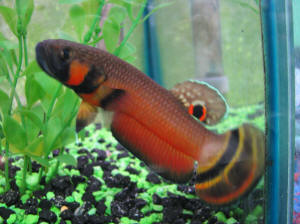
|
 |
New
Print and
eBook on Amazon
Betta Success
Doing what it takes to keep Bettas healthy long-term
by Robert (Bob) Fenner
|
|
Re: Hi! Question for the Bettas :); var.s
7/19/14
Hi again,
Sorry to bother you but i would like to have your opinion on the fish's
tail. What is your opinion on that tail type? (veiltail, delta,
roundtail, etc)
Thanks Again!
Kellan
<Greetings. I have no great expertise at fancy Betta varieties I'm
afraid, but would suggest this is (more or less) a "Plakat" style Betta.
These have become quite popular in recent years. They are usually a bit
easier to keep than the long-tail varieties. Cheers, Neale.>
Re: Hi! Question for the Bettas :) 7/19/14
Thanks Neale! A little while after sending the email i noticed the small
white egg spot on her underside.
<Indeed, but do bear in mind the genital papillae are visible on *both*
sexes, though admittedly it's bigger and more obvious on females. Keep
an open mind. Cheers, Neale.>
|
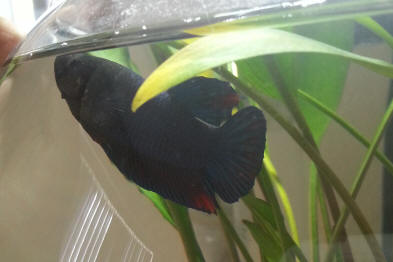
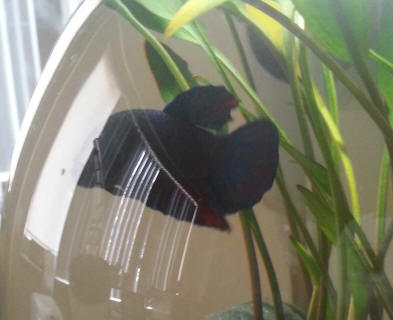 |
|
Hi! Question for the Bettas :)
7/18/14
Greetings!
I have recently purchased a male Betta imbellis from a local fish shop.
(I am aware that if this is a hybrid at best) I am wondering if this
indeed is a male Betta imbellis or a female Betta splendens. (Btw I have
attempted to get the fish to flair, this had mixed results. The fish
seemed to flare fins but not gills.)
I have attached a photo. (poor quality… I agree, btw the speck on the
dorsal fin is actually food. I was attempting to wane)
Thanks for your time!
Kellan
<Hello Kellan. Identifying Betta imbellis is hard, harder than many
suppose because there's a lot of overlap with genuine wild-caught (or at
least, wild-type, non-fancy) Betta splendens that have very similar
colouration and fin lengths. However, male Betta imbellis typically have
red edges to their fins and the green-blue colouration is distinctly
stripy, on the gills, on the flanks, and on the unpaired fins. Yours
appears to be a plain vanilla shortfin Betta splendens, so far as
colouration goes. The blue is much deeper (less turquoise) than Betta
imbellis, and it's solid rather than stripy. The red is simply "there"
rather than discrete edging that tracks the streaky green-blue stripes
on the fins. So bottom line, no, I don't think this is Betta imbellis in
any meaningful sense. Unless you buy direct from a trusted breeder, or
else from an aquarium shop known to deal in (usually expensively)
wild-caught and/or high-quality oddball fish, then you can disregard any
supposed Betta imbellis as, at best, murky hybrids. Critically, this
means your Betta is unlikely to be as peaceful as true Betta imbellis.
Cheers, Neale.>
|
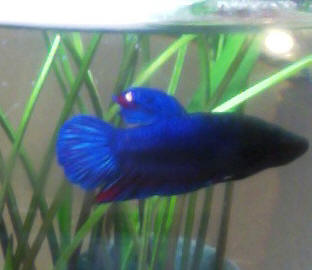 B. splendens RMF
B. splendens RMF |
Betta Grand Champ Aquarama 2013
5/31/13
Bob
Betta Grand Champ in two different angles
<Imagine the conditioning, the training employed here to urge this fish to
display during the judging, show. BobF>
Perry |
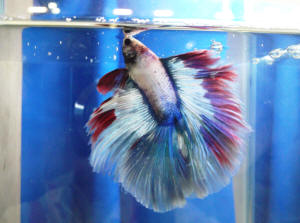
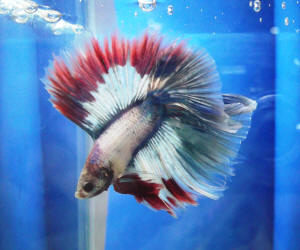 |
Re: Betta Grand Champ Aquarama 2013
5/31/13
Yes, I did not realize how beautiful the fish was until I downloaded the
photo onto my PC
Regards
Perry |
|
Fish Carnival 2012 12/9/12
Bob
Pics from the last show of the year. This one won the best Half Moon of
the show award
<Verra nice Perry. B>
|
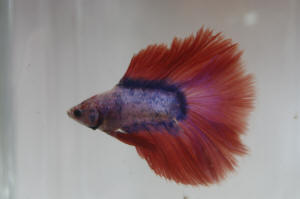 |
Singapore Fish Carnival 2012
12/9/12
Bob
This beauty won the Best Crowntail of the show
Perry<A beauty. B> |
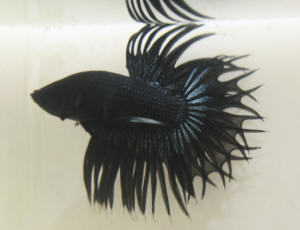 |
Singapore Fish Carnival
12/9/12
Bob
The Betta Grand Champion
<A female! B> |
 |
How to tell if my Betta is a pure Imbellis? 12/4/12
Hi! I keep Bettas, and I recently bought some Betta imbellis from
someone who had mixed fry from two different batches. One of the batches
of fry was pure and the other was hybrid. Is there any way to tell the
difference between hybrids and pure bloods besides them having a red
anal fin, red tail fin, and green bars on the cheeks? Also, one of them
has black fins which is how I know it's a hybrid. Would that mean that
all the hybrids would have black fins, or could some look exactly like
pure imbellis?
Thanks so much!!
Sincerely,
Josh
<Hi Josh. It's basically impossible (and I certainly can't help without
photos!). Visual traits like the colours on fins are very variable
anyway, so aren't always reliable ways to tell whether a given fish is
either Betta imbellis or Betta splendens, let alone a hybrid between
fancy Betta splendens and Betta imbellis of unknown provenance and/or
pedigree. Do you know what the parent Betta splendens looked like? Both
the male and the female? That'd help. But remember, a female Betta
splendens may look drab, but she'd still be carrying genes for the
bright colours seen on males, she simply doesn't express them in her
phenotype. Over time it might be apparent which fry are pure and which
aren't as they approach maturity, but as fry, Betta spp. all look pretty
similar, and some traits might not be expressed at this stage. Frankly,
if you want Betta imbellis, go choose stock you can be sure about.
Cheers, Neale.>
Re: How to tell if my Betta is a pure Imbellis?
12/5/12
I received an email saying that the father of the hybrids was black and
green which matches with the hybrid I know about. Thanks a lot! I
believe that I have 5 pure imbellis. Can't wait to breed them. Is there
any special way of breeding them?
<Not really; they are closely related to B. splendens and breeding is
much similar, though of course the juvenile males will be less
aggressive and consequently easier to house together. The real problem
with Betta species is feeding the fry; do read up on how to culture
infusoria, because that's key to success. The fry need to be some days
old before they're big enough for baby brine shrimp. Cheers, Neale.>
|
Betta fish identification - 12/02/2012
Dear Crew at WWM,
I've had my Betta (named Alpha) for a couple of months now and have
began to wonder what type specifically he is. I acquired him at a local
PetCo and no longer remember the hasty classification they gave him. He
is pale red on the head blending through pink to purple and finally to
blue on the fins. I've been searching online for colorations like his
but am having no luck. Anything is helpful to satisfy my curiosity.
-Danielle
<Hello Danielle. Alpha is a fancy Betta splendens, and like all the ones
sold in chain stores and most of the ones in aquarium shops, he's a "moggie"
rather than a show quality pedigree specimen. So go ahead and make up a
name for his variety if you want! There are several clubs and
associations dedicated to fancy Bettas, of which the most notable is
probably the International Betta Congress:
http://www.ibcbettas.org
They have an online forum as well a various local chapters, and if you
really want to pin down the possible ancestors of your specimen, they're
the people to contact. Cheers, Neale.>
|
 |
|
Betta... ID 12/31/09
this may be a dumb question since I don't have a picture to
attach but I just got a female Betta (that's what it came to
the store labeled as) but I am positive it's not a female
Betta splendens. It definitely looks like a female of some sort
from the research I've done but it has an upward curved mouth
and is white with some green scales and light green fins. It is
also double the size of the female Bettas I have. I know your not
going to be able to identify it for me based on that, I was just
wondering if it is possible it could be a wild species that got
sent to the store by accident.
<To be honest, it's extremely unlikely generic pet stores
will carry Betta species other than Betta splendens. There
certainly are lots of other Betta species, including some
relative giants up to 14 cm in length, such as Betta akarensis
and Betta anabatoides, but these are only traded in the very best
aquarium stores and usually have notably different prices than
the farmed Betta splendens pumped out by the million. Female
Betta splendens get to about 3-4 cm, so if you have a fish twice
that size, it's probably not Betta splendens. A photo would
be useful. Otherwise a little
time spent on Fishbase might be useful.
http://filaman.ifm-geomar.de/identification/specieslist.cfm?famcode=429&areacode=
Cheers, Neale.>
Re: Betta ID 12/31/09
Thanks for answering =) I'll try to figure it out/ get a
picture and let you know
<Look forward to seeing the photos. Do note that we prefer
images 500 KB or smaller in size, so don't send the original
1, 2, 3 MB photo. Large photos fill up our e-mail space, bouncing
back messages from other people. Cheers, Neale.>
Betta 12/31/09
bad picture I know
<It looks a lot like one of the "mouthbrooding
Bettas", and if somewhere between 5 and 12 cm in size,
that's certainly the case. These Betta species have
proportionally larger mouths, as well as greater overall size,
than
the bubblenest building Betta species. Note that mouthbrooding
Bettas come from flowing rather than still water habitats --
that's why they mouthbrood their eggs rather than build
bubblenests -- so the aquarium should offer a
decent water current, somewhat lower water temperature, and lots
of oxygen. Look over that Fishbase page mentioned earlier to
identify the species you have; I really can't from the photo
you sent. Again, please reduce image size to 500 HB next time.
Some of the less charitable crewmembers simply bounce back
messages with overly large images. I'm a nice guy, but best
to stick to the rules. Cheers, Neale.>
re: Betta
Yeah I didn't receive the image size email until I had
already sent it =(
sorry I'll keep looking on that site for the exact name
although I haven't had any luck yet. Very odd a pet store
that only gets b. splenda got that in but goof for me =) Thanks
for the help
<Happy to help. Cheers, Neale.>
|
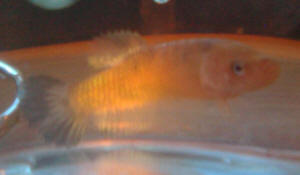 |
|
Big female Betta + Happy New Year
1/1/2010
Happy New Year to everyone at WWM!
<Hello Jen,>
I was just reading the freshwater daily FAQs, and while I have no
firm ID on the recent Betta photo, I may have a potentially
useful reference photo of a large female Betta splendens I
owned.
<Is indeed a female Betta splendens. On the other hand, the
female Betta we were discussing yesterday has a more tapering
body and a proportionally larger head, classic features of
mouthbrooding Bettas.>
I assume she was at the larger end of the normal size range, and
had some of the longest fins I've seen on a female
<There is a trend towards brighter colours and longer fins in
female Betta splendens; indeed, this makes them rather good
alternatives to things like Dwarf Gouramis in small community
tanks, and certainly easier to keep thus than male Betta
splendens.>
- I think you can still make out the white ovipositor spot in
this scaled down version.
<Indeed, and for whatever reason, this feature is quite
commonly visible on Betta splendens.>
She recovered from the mild tail splitting/rot in the photo --
thanks again to WWM reference and good old upped water
changes.
<Cool.>
Take care and happy fishkeeping in 2010!
<Likewise, I'm sure.>
- Jen
<Thanks for writing! Cheers, Neale.>
|
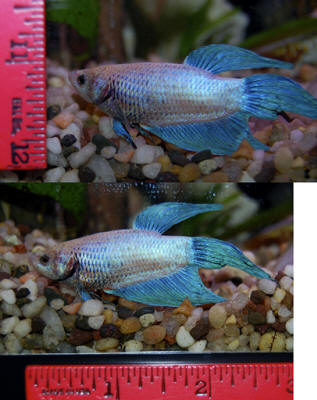 |
Male Crowntails or Girls with Attitude?
11/05/09
Hi there! I'm having some Crowntail confusion. I recently came
across a batch of Crowntails that look like females but act like
males.
<There are fairly aggressive, territorial animals.>
They are very aggressive (as both male and female Crowntails are) and
they are displaying their opercula (I've seen females do this as
well).
<Indeed.>
They are not brightly colored (not pastels), but dark rich, red, blues,
purples, etc. Very striking colors.
<Sound charming.>
Anyway, I'm very confused because they are very energetic with
their displays, yet they have the shorter Crowntail caudal fin.<I
see.>
Even the ones who seem rounder like females are also vigourously
displaying. They are full adults, so they are done maturing.
<Since males are sent out to pet shops individually bagged, it seems
to be rather unlikely they'd mix up males and females. I will make
the observation here that mature females tend to show their white
genital
papillae, even when not actively spawning, so a batch of female fish
would have at least some fish with this obvious feature
visible.>
Is there a male short fin Crowntail type that is out now?
<I'd expect so. I'm not an expert on these fancy Bettas, but
my understanding is that some breeders do produce shorter-finned
versions.
Cheers, Neale.>
|
Betta long side fins common? --
4/12/08 Hello! im writing this is hopes you can answer a
question for me, today i was looking to buy a few new Bettas and
i saw one that to me seemed a little odd this Betta had extremely
long (not large) side fins, they reminded me of the dorsal fins
almost they were long and narrow bit short and wide like all the
other Bettas i have seen, my question is, is this a common trait
or s mutation 9 in a good way) it was a beautiful fish and i will
adopt him but any info you could give me would be great thanks in
advance Tommy <Have not seen this myself in Betta splendens,
but such long-finned-ness has occurred spontaneously (and been
capitalized on commercially) in other species (my fave example is
Brachydanio rerio, the Zebra Danio...) and so, am not surprised.
If such a genetic "anomaly" doesn't become too
disadvantageous, this trait may well lead to new lines of
breeding... If these fish are apparently doing well... I would
keep them. Bob Fenner>
Re: long side fins common? Betta 4/13/08 thank
you for the response!, that's awesome!.. am going to attempt
to breed him not for any profit but to experiment to see if he
will produce off spring of the same (condition?) i have included
a rather boring picture ( only one i could get of him he
wouldn't sit still lol) you can really see the extremely long
pectoral fins i wrote to you about.. ill let you know how the
breeding went thanks again.. <Real good. Cheers, BobF>
|
|
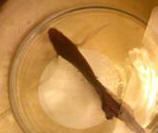
|
| Sabrina's Betta macrostoma
2/3/08 Sab, howzit? <Going very well, actually. Busy, but
very well. A piece of good fishy news: a close friend of mine works
at a fish shop and called to let me know they had a *very* nice
pair of Betta macrostoma.... the first fish I ever wanted (heh,
when I was six and saw a picture, and didn't know they were
unobtainable....!) and the only fish I had given up altogether on
ever even seeing. So, three weeks and $300 later, <!!!>
<<More than I would have initially wanted to spend.... But
the pair is every bit of four, five inches, each. They really are
*spectacular*. And since, in all my years of interest in fish, I
have never even had the opportunity to *see* a macrostoma, I went
ahead and took the risk. I'll attach a photo.... Not the best
pic I've got, but it's of the male displaying while he was
still in the shop. It's probably the best pic I've got of
him displaying, as the tank I've got them in is currently very
dimly lit.... as I slowly increase the lighting, I'll be able
to get better pics, I hope. They look much better in a nice, big
tank with live plants, rather than in an icky store tank full of
plastic plants!>> >Very nice< I went in to see them,
and home they came. It's only been two weeks today that
I've had them, but they appear to be doing well thus far. They
have spawned once already, but the pH was still too high and the
boy swallowed the eggs. I am hopeful that they will remain in good
health and be happy enough to spawn again, now that the pH is nice
and low. I have taken hundreds of photos, and a few have turned out
very, very nice - I would gladly send them to you if they will be
of any use in WWM.> <My usual goosing here re your writing
all up...> <<Consider me goosed, then! I've been
keeping a lot of records since bringing them home, and will surely
write something up, even if it's nothing more than a
"here's what I did" sort of thin. But - FIRST - I
have to keep them alive, eh? They look good tonight.... The female
is in full breeding dress, and the male displaying very nicely.
Hopefully my macros will be getting' lucky!>>
>Good< > > Am out in HI... yes, still working on the
KAEC... > > <Good, good!! The KAEC is always in the back
of my mind.... and I am still and always ready to be there at the
drop of a hat!> <This may indeed happen...> <<Oh?
Yes? Any new news? Things progressing well or at all? I'll be
there in a heartbeat when you need me.... Oh! And it is legal for
me to bring macrostomas into Hawai'i! I have been having dreams
of spawning them in huge outdoor vats in Hawai'i.... Sigh!
Perhaps some day....>> >Still working on the land and
money aspects, but some progress... So, don't lose faith.
B< |
|

|
The Noble, Abused, Underrated FW Betta 7/21/07 What is
the difference between a Fancy Betta Fish, and a Fighter Betta Fish?
<Evening Renee, Andrea with you tonight. I hope you don't mind
my using your query for a slight diatribe on one of my favorite fish.
First off, allow me to point you to a fine source of information of the
freshwater Betta splendens, our very own WetWebMedia.Com:
http://www.wetwebmedia.com/FWSubWebIndex/bettafaqs.htm. Please feel
free to read that, as well as the linked articles above. If you are
considering a Betta, please, choose carefully and wisely, and provide
it a proper home. Bettas are among the most misunderstood and
mistreated animals in this hobby. I hope someday to write an article
about the proper husbandry of these personable, beautiful and
fascinating animals. In short, there is no difference.
"Fancy" Bettas may be used to denote a more structured, bred
Betta with a tail that is "Crowned", "Half-Moon",
or "Plakat" among other types, or specifically bred for a
color variant, such and the white lined "Butterfly" or the
popular "Mustard Gas" color strain. The "Siamese
Fighting Fish" is just another name for the Betta, and frequently
what the "Betta in a cup" is sold as. Betta breeding is very
popular in many countries overseas and is taking a foothold in the USA.
These Bettas often sell for 10 to 20 times what you would pay at your
local chain pet store, some upwards of hundreds of dollars, and quite
worth the money if you ask me. If you are considering one of these fine
animals for a pet, I encourage you to do plenty of research on
providing them a proper life, and home, and please, come back and ask
any questions you may have on doing so. I'll be happy to help you.
> Kind Regards, Renee Kohncke <Thanks> <Andrea>
Betta (crowntail or tail rot) 3/4/07 Hey guys!
<<Hello, Karley. Tom here.>> A friend who works
at an aquaria store nearby told me to ask you guys since he wasn't
too sure how to help me. <<Okay.>> I have a male betta that
I bought 3 months ago. I'm not too sure what type it was
but looked like one of your run of the mill bettas (not a
crowntail). I bought a 2 gallon tank for him, a couple silk
plants, a small tank under gravel heater, and a filter. The
filter was rarely used since the tank was small and he doesn't like
too much current. I fed him a small amount of flakes twice a
day. (Let me just say that I am a complete fish
virgin.) I did weekly water changes but was too stupid to
notice all the poo stuck to the bottom of the plants and gravel.
<<Part of the problem with 'smallish' tanks is that they
don't easily lend themselves to cleaning the substrate,
etc.>> (Since then I've bought a saltwater reef tank with all
the trimmings and actually learned a great deal about being a
responsible fish owner.) <<Glad to hear this,
Karley.>> Because of the reef tank I have learned about ammonia
and nitrites and all that jazz. I bought a Hagen test kit
with all the droppers etc... Anyway, Betta's ammonia levels were
off the charts. <<Oops'¦>> I did a
100% water change and he seemed to be doing great except for his tail
was looking rather ragged. And it seemed to be on all his
fins. From all the pictures and research I assumed he had tail
rot. <<A reasonable assumption given the
circumstances.>> I tried the BettaFix (tea tree oil) and nothing
happened. So I bought a 10 gallon tank and "hospitalized"
him. I medicated him for 5 days with Maracyn 2 (and the usual amount of
freshwater salt). <<The salt is the safest way to go for this
situation.>> After 7 days I did a 100% water change. I have a
small filter on at all times and a proper Jaeger heater set at 79 1/2.
He's still a happy guy, swimming and eating, but his tail looks the
same. It's been a month since I put him in the new 10
gal. tank. Water quality is top notch. (I have a tap water filter that
I got for the reef tank.) No ammonia, nitrate, or nitrite, perfect pH.
<<I like the sounds of that!>> Well, I was very confused,
so I invited my aquarium friend over to look at him and maybe attempt
some surgery if needed (cutting off the offending pieces).
<<Eeek! There are rare occasions when a surgical procedure is the
only way to save the animal's life but 'cosmetic' surgery
is a good way to end its life.>> He looked at betta and said that
he looks exactly like a crowntail betta and didn't want to do
anything until I got some advice from you.
<<Whew.>> Looking at pics of other crowntail bettas he
looks like them, but he definitely didn't when I bought him and it
was kind of strange that this all started around the time of the
ammonia incident. <<Coincidental.>> So my very
long winded question for you is, can a crowntail betta look like a
normal one and a month later have those "special" looking
fins? <<Possibly. Bear in mind that same finnage
traits that make Crowntail distinctive can be present in any Betta. The
gene responsible is partially dominant which makes it a good bet that
as long as one parent shares the gene, the offspring will share it as
well. In other words, you'd have to be sure of the breeder to know
that you're getting a 100% Crowntail Betta.>> Any response
would be oh so helpful. BTW, I love your site, it actually
helped me out a lot with my clownfish. Very comprehensive.
<<Thanks, Karley. We appreciate it and we're happy to have
been of help.>> Thank you ever so much in advance,
Karley P.S. I've never had any other fish with him so he LOVES his
10 gallon tank to himself. <<A ten-gallon tank is about the
optimum size for Bettas so I don't doubt for a moment that he's
in 'fishy Heaven'. Best regards. Tom>>
 |
New
Print and
eBook on Amazon
Betta Success
Doing what it takes to keep Bettas healthy long-term
by Robert (Bob) Fenner
|
|
|

